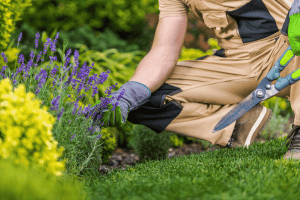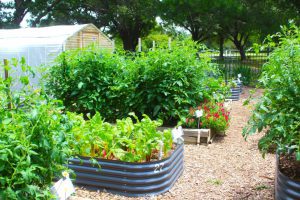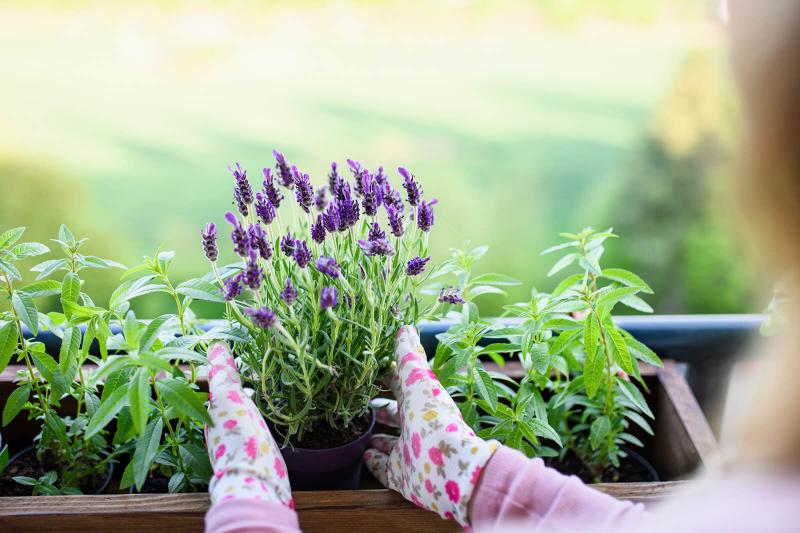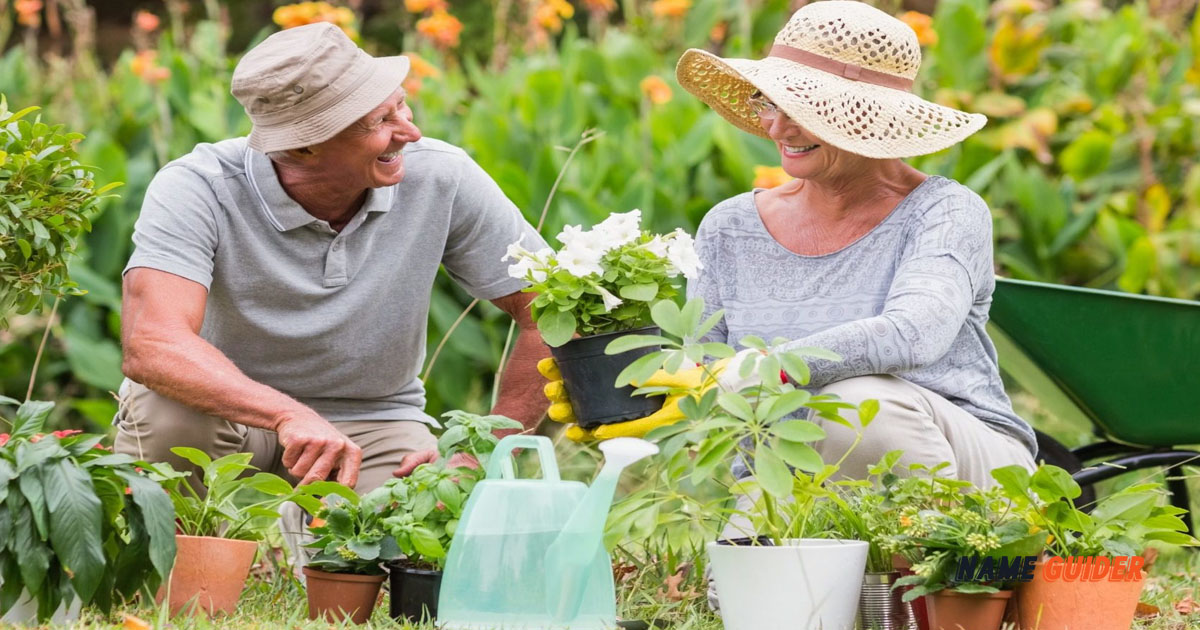Understanding how to become a gardener begins with gaining hands-on experience and learning about plant care through courses or workshops. Consider obtaining qualifications like the RHS Level 2 Certificate to enhance your skills and job prospects.
What Are the Main Types of Gardeners?

Gardeners work in people’s homes, pubs, parks, and botanical gardens. They use their knowledge of plants, landscaping, and horticulture to design, plant, and maintain green spaces. There are various types of gardeners, each divided into categories based on their work, environment, and tasks.
- Residential Gardener: Residential gardeners typically work in private residences, maintaining gardens for homeowners. They are usually contracted to care for plants, mow lawns, prune trees and shrubs, weed, plant flowers, and ensure the garden remains attractive to the homeowner and guests throughout the year.
- Commercial Gardener: Commercial gardeners maintain outdoor spaces for businesses, public buildings, and larger commercial properties. Their tasks may include laying sod, planting grass and leaves, mowing large lawn areas, pruning trees and plants, and executing seasonal planting or garden projects.
- Landscape Gardener: A landscape gardener creates and constructs gardens and outdoor spaces, with a focus on hard landscaping elements such as paving, decking, water features, and retaining walls.
- Horticulturist: A horticulturist possesses extensive knowledge of plants, flowers, and trees, often working in botanical gardens, nurseries, or large estates. They cultivate plants, develop new varieties, and may specialise in research or conservation.
- Groundskeeper: A groundskeeper oversees the care of public areas, such as parks, sports fields, and schools. This role involves maintaining lawns and gardens, as well as keeping these spaces clear of debris and safe for use.
- Botanical Gardener: A botanical gardener curates a botanical garden, where plants are collected, grown, studied, and displayed. Their work involves conserving, maintaining, and propagating plants, often incorporating research and teaching.
- Vegetable Gardener: Vegetable gardeners grow food crops in both small home gardens and larger community gardens. They primarily focus on planting, caring for, and harvesting fruits, vegetables, and herbs, often using organic and sustainable practices.
- Tree Surgeon: Tree surgeons, also known as arborists, prune, trim, and remove trees. They can diagnose and manage tree diseases and often work at height, using specialised equipment.
- Estate Gardener: Estate gardeners work on large private estates, historic properties, and other sites with extensive gardens and grounds. They may be responsible for various garden styles, including formal gardens, vegetable plots, orchards, and woodlands.
- Sustainable Gardener: Sustainable gardeners emphasise environmentally friendly practices, such as composting, water recycling, and using organic methods to control pests, creating gardens that are both beautiful and ecologically responsible.
What Does a Gardener Do?
Gardeners are responsible for taking care of outdoor spaces such as gardens, parks, and green spaces. Their main aim is to keep these areas healthy and visually appealing. The duties of gardeners depend on the type of garden they are working in and the season. Below is a list of tasks, paired with instructions and further context:
- Plant and Grow Plants: Gardeners plant a variety of species – including flowers, shrubs, trees, and vegetables – according to the garden’s design and purpose.
- Weed Control: One of the most important responsibilities is ensuring that the garden remains free from weeds and pests that could harm plants. This may involve manual weeding or the responsible use of organic methods or pesticides.
- Pruning and Trimming: Gardeners prune shrubs, trees, and plants to promote healthy new growth, improve the shape of the plant, and remove dead or damaged portions at regular intervals.
- Lawn Care: Lawn care is a time-consuming task that involves mowing, edging, aerating, and fertilising, as well as addressing issues like patchy grass or pest infestations.
- Watering and Irrigation: Gardeners provide water for plants through hand watering or by installing and maintaining irrigation systems. They must understand the varying water needs of different plants.
- Soil Preparation and Fertilisation: Soil preparation is essential, as plants will not thrive without enriched soil. This process includes tilling, mixing the soil with compost or other organic matter, and adding fertiliser when necessary.
- Seasonal Planting: Gardeners plant flowers, vegetables, and other plants according to seasonal guidelines, removing them as needed and planting annuals in their appropriate seasons.
- Design and Landscaping: Some gardeners, particularly landscape gardeners, design gardens and outdoor spaces, including plant selection, garden layout, and hardscaping features like paths and water features.
- Garden Equipment Maintenance: Gardeners must maintain their tools, such as lawnmowers, hedge trimmers, and pruning shears, to ensure they remain effective.
- Monitor Plant Health: Regular inspections of plants for signs of disease, pests, or nutrient deficiencies are crucial. Quick detection allows for corrective action, such as diagnosing and treating issues or removing affected plants before they spread.
- Composting and Waste Management: Many gardeners manage organic waste by composting, converting garden trimmings and other plant materials into compost that can enrich the garden.
Average Gardener Salary

A gardener’s salary in the UK can vary depending on experience, location, and the type of gardening work. Gardeners employed by estates, businesses, or public organisations typically receive a regular salary, while self-employed gardeners usually charge hourly or per project. Here is a breakdown of typical gardener salaries:
- Junior Gardener: An entry-level gardener earns between £18,000 and £22,000 annually. This position often involves individuals who are new to the job or still learning under the supervision of an experienced gardener.
- Mid-Level Gardener: With a few years of experience, salaries can increase to between £22,000 and £28,000. Mid-level gardeners often work independently or on smaller gardens and may be required to undertake more complex tasks such as landscaping.
- Head or Senior Gardener: A head or senior gardener managing a large estate or multiple staff can earn between £28,000 and £40,000. This gardener is typically experienced in running gardens of significant scale and likely participates in design and overall planting plans.
- Self-Employed Gardener: Self-employed gardeners usually charge between £15 and £30 per hour, depending on their experience, the complexity of the work, and their location. Those who specialise in landscaping or tree surgery tend to charge higher rates.
- Landscape Gardener: Combining horticultural work with hard landscaping tasks such as paving and building structures, a landscape gardener can earn between £25,000 and £45,000 per year or more, depending on their experience and the scale of the work involved.
Essential Skills of a Gardener
To be a good gardener, you must combine the practical aspects of the job, your knowledge of plants, and a strong work ethic into one holistic package. You should be able to work alone or as part of a team, manage your time effectively, and be an all-around plant carer. Here are the key skills you need to be a gardener:
- Plant Knowledge: A gardener must know various species of plants, their requirements for growth—such as soil, water, light, and air—where they can be planted, and whether they are native, perennial, annual, or invasive.
- Attention to Detail: Gardening is a detail-oriented job. Incorrect pruning or watering can have detrimental effects on plant health, so it’s important to pay attention to details.
- Physical Strength: Gardening is physically demanding; it involves carrying, digging, weeding, and spending hours outdoors in all weather conditions. To be a gardener, you need to be fit and healthy.
- Problem-Solving: A good gardener must excel at identifying and resolving problems. Understanding why your plants are not thriving and determining what actions to take requires independent thinking.
- Basic Design Skills: Basic design skills are useful for all gardeners, even if they are not involved in garden design. They need to be able to lay out plants in a way that is aesthetically pleasing and functionally appropriate for the garden.
- Tool Maintenance: Gardeners must know how to use and maintain various tools, including lawnmowers, hedge trimmers, and hand tools, and understand proper maintenance techniques.
- Time Management: Gardeners often juggle multiple tasks concurrently, such as planting, watering, weeding, and pruning. Good time management is essential, especially in large gardens or during busy seasons.
- Communication Skills: Effective communication is vital for gardeners, especially those working for clients or businesses. They must be able to discuss garden plans, and maintenance schedules, and identify issues with clients and supervisors.
- Identification of Pests and Diseases: A good gardener must understand how diseases can affect plants, how to eliminate or prevent them and recognise signs of nutrient deficiencies or pest infestations.
Tips For Gardener

Here are some practical tips for aspiring gardeners who want to build a successful career:
- Start Small: If you’re new to gardening, begin with small projects. Volunteer in a community garden or offer to care for a friend or neighbour’s garden to build your confidence and skills.
- Plant-Specific Research: Learn about each type of plant and the conditions under which it will thrive. Consider the types of plants and soil. The more you know about plants, the more likely you are to create beautiful gardens. Take classes in horticulture or attend gardening workshops to expand your knowledge.
- Get Dirty: Gardening is a practice; the more you do it, the better your skills will become. Experiment with different types of plants in various environments to understand their needs. Gaining experience in diverse locations, such as beautifying home gardens and maintaining public parks and greenhouses, will make you a more versatile gardener.
- Invest in Good Tools: A gardener’s tools greatly enhance efficiency, so invest in quality equipment. This is not a place to skimp. A good pair of pruners, a reliable trowel, a sturdy shovel, and effective watering equipment will be well worth the investment. Keep your tools clean and well-maintained, and they will serve you effectively for years.
- Be Patient and Observant: Plants don’t grow instantaneously; they take time to develop. Be observant and learn to recognise early warning signs that something might be wrong, such as wilting plants, discoloured leaves, or pest infestations, so you can intervene before the situation worsens.
- Grow a Green Thumb: Embrace sustainable gardening practices, including composting, mulching, and using biological pest controls. These methods conserve resources, reduce waste, and enhance ecosystem health. Understanding sustainable techniques can make you a more well-rounded gardener and attract eco-minded clients.
- Network with Other Gardeners: Join a local gardening club and participate in online gardening forums to connect and share knowledge. Learn new techniques and discover how others are succeeding in the industry. Getting involved in non-gardening hobbies, such as yoga or bingo, can also expand your social network, which can be beneficial.
- Compile a Portfolio: If you’re looking to start a career as a freelance gardener or consult on landscape design projects, create a portfolio to showcase your work. Include before-and-after photos of gardens you have designed or maintained, along with client testimonials.
- Be Aware of Trends: Gardening trends change frequently—vertical gardening, xeriscaping, edible landscaping, etc. Keeping up with these trends will help you provide innovative solutions to your clients and keep your gardening skills current.
Gardener Requirements
Although there are no formal qualifications required to become a gardener in the UK, having practical experience, knowledge, and possibly training in horticulture will boost your career prospects. Here’s what you need to do to start a career as a gardener:
- Practical Experience: Most gardeners start their careers by gaining practical experience through working in gardens, volunteering, or maintaining their own garden spaces. Acquiring as much practical experience as possible is crucial for developing the skills needed to work as a professional gardener.
- Horticultural Training: While not essential, completing an RHS horticulture course or apprenticeship can provide you with valuable skills and credentials that may enhance your career opportunities. The Royal Horticultural Society (RHS) offers widely recognised horticultural qualifications.
- Plant Care Knowledge: Gardeners should have a thorough understanding of plant species, types of soil, pest control, tools, and techniques. Continuous learning in these areas is key to success.
- Physical Fitness: Gardening requires physical strength for tasks such as digging, lifting, and working in varying weather conditions. Candidates must be physically fit to perform the job effectively.
- Communication Skills: Effective communication with clients or employers is essential for discussing garden maintenance, design plans, and addressing any issues related to the garden. This skill is important for managing client expectations and providing excellent service.
- Licences and Certificates: Some gardening jobs, particularly those involving tree surgery or the use of proprietary or specialist equipment, may require additional qualifications, such as chainsaw licences or health and safety certificates.
How to Become a Gardener

Becoming a gardener is a gradual process that starts with hands-on experience, followed by horticultural learning and the acquisition of relevant qualifications. Here’s how to become a gardener in the UK:
- Get Some Practical Experience: Start by gaining practical experience in gardening. You could work on your own garden, volunteer at a community garden, or take on small land-based jobs, such as helping friends with their gardens. The more experience you gain, the better, as in any career.
- Learn About Plants and Gardening Techniques:
- Familiarise yourself with different types of plants, flowers, and trees.
- Understand their needs and how to care for them.
- Learn about soil types, watering requirements, and the seasons during which plants thrive. Consider taking gardening courses or workshops.
- Formal Training: Although not necessary, completing a qualification can improve your chances of securing a job. The Royal Horticultural Society (RHS) offers a wide range of courses for all levels of experience, including the RHS Level 2 Certificate in Practical Horticulture, designed for anyone aspiring to become a professional gardener.
- Buy the Right Tools: Invest in quality gardening tools, such as a pair of pruners, a spade, a rake, and a lawnmower. The right tools will make working in your garden a pleasure and enable you to work more efficiently. Ensure you know how to maintain your tools properly.
- Build a Portfolio: If you want to work as a self-employed gardener or start a landscape gardening business, create a portfolio showcasing your work. Take photos of gardens before and after you’ve worked on them, and keep testimonials from your clients. A portfolio will help demonstrate your skills to potential customers or employers.
- Get a Job or Start a Business: You can apply for gardening positions at garden-related companies, public parks, estates, or botanic gardens. Alternatively, if you prefer self-employment, you can start a business offering lawn mowing services, planting services, and overall garden care to local clients.
- Keep Up with Horticultural Trends: Gardening is a constantly evolving field. New techniques, plants, and trends are regularly emerging. Read gardening books, attend horticultural shows, and join gardening clubs or forums to stay informed.
- Take Specialisation: Once you have gained experience, you might consider specialising in a particular area of gardening, such as vegetable gardening, tree surgery, or landscape design. Specialising can enhance your earning potential and improve your career prospects.
Get Qualified as a Gardener
Gardening Techniques Workshop, Online Tree Trimming Safety Training, Gardening Basics, Gardening Online Course
Frequently Asked Questions
Why Should You Become a Gardener?
An aspiring gardener can expect to work outdoors, be creative, and contribute to the environment. Pursuing gardening as a profession is a great choice for those who love plants and nature and find satisfaction in seeing gardens thrive under their care.
Is Being a Gardener a Good Career Choice for You?
If you enjoy working outdoors, are passionate about plants, and don’t mind getting your hands dirty, you would be a good candidate to become a gardener. This job is ideal for creative and hands-on individuals who wish to improve green spaces.
Average Gardener Salaries
In the UK, salaries for gardeners vary depending on experience, specialisation, and location. For those just starting, annual salaries typically range from £18,000 to £22,000. Gardeners with more experience or specialisations, such as landscape gardening, can earn between £28,000 and £40,000 or more.
Which Qualifications Can Help with a Career as a Gardener?
Further qualifications, such as the Royal Horticultural Society (RHS) Level 2 Certificate in Practical Horticulture or diplomas in landscaping, arboriculture, or garden design, will enhance your CV.
Do I Need Experience to Get Started as a Gardener?
While you may not land a job by simply stating, “Here I am, a complete novice, but I’d like to be a gardener,” having proof of hands-on experience—such as volunteering, working in a community garden, or maintaining a basic garden in your backyard—will put you in a much better position.
Gardener Career Outlook
The demand for gardeners in the UK is considered stable, with opportunities to work in homes and offices, estates, parks, and farms. With a continual rise in home and office landscaping, the demand for gardeners and landscapers remains steady.
Gardener Hierarchy and Progressing Within the Role
Gardeners typically start in entry-level positions and can progress to become head gardeners or estate managers through years of experience. In some cases, they may transition out of horticulture entirely into landscape design, horticultural consultancy, or tree surgery, which generally offers higher salaries.
Gardener Exit Options and Opportunities
Some gardeners become landscape designers, horticultural therapists, or conservation workers, while others may start their own garden-related businesses, offering specialised services to clients.


